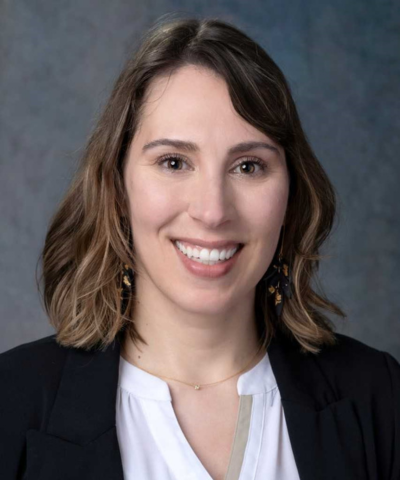
Introduction
Eva Coulson, PharmD, BCPS, is a Pain Management Clinical Pharmacist at Kaweah Health and precepts PGY1 residents and pharmacy students from the University of California, San Francisco. She completed her PGY2 Pain Management residency at the University of Iowa, following her PGY1 at the University of Iowa Hospitals and Clinics. Dr. Coulson holds a Doctor of Pharmacy degree from Texas Tech University and a BS in Economics from Texas A&M University. She also completed teaching certificates through the University of Iowa College of Pharmacy. Learn more about her here.
Why Pharmacy
When I graduated high school, I had no idea the world of pharmacy existed. I first learned about it from my best friend in general chemistry, who already knew she wanted to be a pharmacist, and later in my college health disciplines class. Exploring pharmacy careers—community, hospital, consulting, veterinary, and more—I realized I wanted to be the one who helps patients safely take their medications.
Pharmacy school opened my eyes to even more possibilities, especially through residency training. Pharmacists play a crucial role in healthcare, understanding all medications and their impacts. I’m grateful to be a pain pharmacist, specializing in solutions for uncontrolled pain. Helping patients find relief and regain their quality of life is incredibly rewarding.
Career Journey
I first learned about pain management and palliative care pharmacy in my third year of pharmacy school while rounding with a healthcare team at a cancer hospital. One patient was frustrated by how quickly our team came and went. When the palliative care team later explained the patient’s frustration to us, it was a EUREKA moment—I saw firsthand how they educate patients and families, present options, respect choices, answer questions, and provide essential pain management.
Inspired, I researched the field. At the time, there were only 3–4 PGY2 pain and palliative care pharmacy residency programs in the country; today, there are nearly 30, and the field continues to grow. During my residency, I discovered my strongest passion was pain management, though palliative and hospice care remain close to my heart. I truly believe I work in the best pharmacy specialty, making a tangible impact on patients' lives every day.
Current Role and Responsibilities
Each morning, I arrive at the hospital and consult on patients with uncontrolled pain. I review their pain scores, current and past medications, and progress notes before meeting with them. During our conversation, I learn what has or hasn’t worked, discuss their goals, and explore options to improve their pain management. Together, we decide on the next steps.
I then collaborate with their healthcare team—doctors, nurses, physical therapists, dietitians, and others—to align on treatment goals. I document our discussions and my recommendations.
In the afternoon, I precept student pharmacists on my pain management rotation. We engage in topic discussions, journal clubs, and meetings.
Challenges
There’s too much to do and not enough support! We need more research and funding to ensure pain management pharmacists are reimbursed for the care we provide. Unfortunately, many healthcare institutions overlook the preventive role pharmacists play. When we do our job well, we keep patients healthy and out of the hospital—just like primary care physicians. If pharmacists were recognized, reimbursed, and allowed to practice independently, the healthcare system would save money, and Americans would be healthier.
Rewards
The most rewarding part of my career is seeing a patient who once felt hopeless finally find relief from their pain. The gratitude on their face makes everything worth it. As a pain pharmacist, I have a deep understanding of pain medications and how to tailor treatments to each patient’s needs. By listening to their experience and identifying what’s wrong, we work together to find a solution. When that solution brings real relief, I know I’ve done my job well.
Recently, a patient underwent back surgery and was in excruciating pain. I noticed their medication response could be influenced by genetics. Without prior genetic testing, I suspected their current treatment wasn’t effective and recommended switching from a mu-opioid receptor agonist to another option. After one dose of the new medication, their pain improved significantly. They were able to work with physical therapy and leave the hospital the next day. It was incredibly rewarding to make such a positive impact on their recovery.
Work/Life Balance
I thrive in social settings and have always enjoyed being part of organizations. In high school, college, and pharmacy school, I joined as many as I could—whether running a health fair, hosting meetings, or doing community service—because I love making a meaningful impact. Being involved in these activities taught me to study in focused blocks of time to stay prepared for tests. Looking back, I may have stretched myself thin, but I wouldn’t change the relationships or experiences for anything.
My best advice is to take your academic work seriously, as it lays the foundation for your future patient care. The effort you put in directly influences what you get out of it.
Advice for Students and Aspiring Professionals
Get excited—you’re about to pursue the best career in the world! My advice is to study something you’re passionate about in college and take extra classes to complete your prerequisites. In pharmacy school, I recommend joining the Society of Pain Management and Palliative Care Pharmacists (SPPCP) to start networking. Take clinical rotations in oncology, pain management, pediatrics, and consulting pharmacy. Also, consider attending an institution where you can commit early to a PGY2 in pain management and palliative care. Having two years of training in the same healthcare system is incredibly valuable since the time goes by quickly!